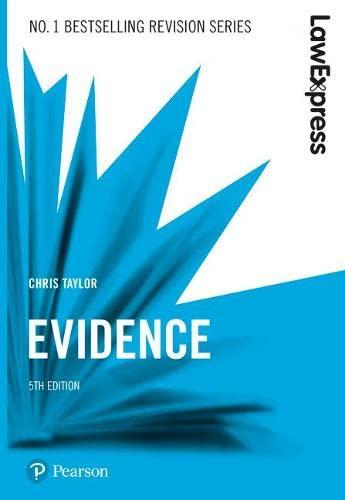Question
Multi-part question regarding Import Transactions (CISG) Talbot Corporation, a furniture dealer located in the United States, ordered low-cost, living-room furniture from Suprapto Corporation, a furniture
Multi-part question regarding Import Transactions (CISG)
Talbot Corporation, a furniture dealer located in the United States, ordered low-cost, living-room furniture from Suprapto Corporation, a furniture maker located in Indonesia. During their initial contract negotiations, Suprapto offered to manufacture and sell a standard living-room set (composed of one fabric-covered couch and two matching, fabric-covered chairs) for $600 (USD). Each item of furniture was composed of wood, metal springs, padding, and a fabric cover which was sewn in place over the padded frame. Under the terms of the offer, Suprapto would purchase all of the necessary components from local sources, manufacture the furniture in Indonesia, and ship it to Talbot's place of business in the United States. All packing and shipping costs were included in the $600 price.
1.
Talbot rejected Suprapto's original offer. Instead, Talbot offered to supply Suprapto with the fabric needed for the furniture at no charge if Suprapto would lower the purchase price to $540 (which would include packing and shipping costs) for each living room set. Suprapto accepted this counter-offer. When Talbot received the first shipment of furniture from Suprapto, it declared the transaction value to be $540. (A) Why is transaction value important? (B) Is Talbot correct in declaring the transaction value to be $540? Clearly and carefully explain.
2.
During the first year of their contractual partnership, Talbot sold over 1,000 of the Suprapto-made furniture sets. Encouraged by this success, it ordered 1,500 set in the second year. Unfortunately, demand among U.S. customers was much less in the second year and Talbot was able to sell only 600 sets in the United States. However, a Mexican retailer contracted to purchase 1000 sets from Talbot. But, when Talbot attempted to buy an additional 100 sets from Suprapto to fill the Mexican order, it discovered that Suprapto already was at full capacity and could supply no more. Instead, Talbot contracted with a local manufacturer to produce 100 sets of equivalent furniture. Talbot then combined its 900 surplus-Suprapto sets with the 100 U.S.-made sets and shipped 1000 sets to the Mexican buyer. Clearly (Be specific.) explain what customs-law issue[s] is/are implicated by this sale?
In subsequent years, as worldwide demand for Suprapto's furniture increased, Talbot had more and more difficulty securing adequate stocks to satisfy demand among Talbot's U.S. and Mexican customers. In large part this was because of growing labor costs in Indonesia as well as increased tariffs imposed on foreign imports of finished furniture by the U.S. government.
3.
Talbot secured from Suprapto the exclusive right to produce and sell under the Suprapto trademark in the United States. It then purchased from Suprapto production machinery used in the manufacture of the furniture. It also bought the key components of the furniture (wood, metal springs, padding, and a fabric cover) from the same Indonesian suppliers that Suprapto had been using. Talbot set up its manufacturing operations in a foreign trade zone located in New York where it used the machinery to produce furniture from the Indonesian components. Fifty percent of the finished furniture was sold to U.S. buyers while the remainder was sold to retailers in Mexico. Clearly (Be specific) explain what customs-law issue[s] is/are implicated by this sale? (I do not want a discussion of the trademark law implications.)
Withers Corporation (a U.S. company doing business in the United States) was a key competitor of Talbot in the U.S. market. Previously, it had sourced all of its stocks from U.S. and Canadian manufacturers but in recent years had been losing more and more market share to Talbot. Accordingly, it contracted with Zhu Corporation (a Hong Kong broker) to provide it with furniture. Withers insisted that Zhu have the furniture manufactured by Suprapto because of its superior craftsmanship. However, Withers was concerned by the fact that Talbot had the exclusive right to market under the Suprapto trademark in the United States and the need to distinguish its product from Talbot's. Thus, it provided Zhu with precise specifications on how its furniture could be crafted in a unique fashion and sold exclusively by Withers. Although it had never done business with Suprapto before, Zhu ultimately was able to persuade the manufacturer to build the furniture.
4.
When the furniture was delivered to Withers in the United States, Zhu charged Withers for the price that Zhu paid Suprapto plus a 10 percent markup. Should Zhu's 10 percent markup be included in the transaction value of the imported widgets? Explain.
5.
Suppose instead that after the furniture was delivered Withers discovered that Zhu was actually a wholly-owned subsidiary of Suprapto. How will this affect the calculation of the transaction value? Clearly explain.
Step by Step Solution
There are 3 Steps involved in it
Step: 1

Get Instant Access to Expert-Tailored Solutions
See step-by-step solutions with expert insights and AI powered tools for academic success
Step: 2

Step: 3

Ace Your Homework with AI
Get the answers you need in no time with our AI-driven, step-by-step assistance
Get Started


